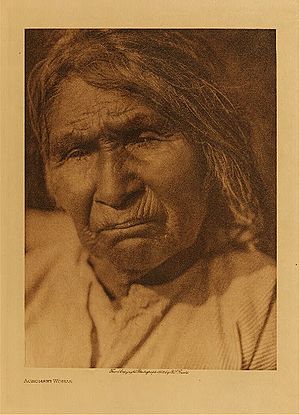Achumawi language facts for kids
Quick facts for kids Achumawi |
|
|---|---|
| ís siwa wó disi | |
| Native to | California |
| Ethnicity | 1,000 Achumawi people |
| Extinct | 2013 |
| Language family |
Hokan ?
|

|
|
The Achumawi language (also called Achomawi or Pit River language) is a special language once spoken by the Pit River people. They lived in the northeast part of what is now California. The name Achumawi comes from ajúmmááwí, which means "river" in the language of the Fall River band.
People who spoke Achumawi lived in nine different groups. Their language had slight differences, like different dialects. These differences were mostly between groups living upriver and those living downriver. The Big Valley mountains helped separate these two main dialect areas.
Language Family Connections
Achumawi and the Atsugewi language are thought to be part of the Palaihnihan language family. This means they are related, like cousins in a big language family tree. This family is different from the nearby Shastan family, but they might also be distantly related.
Sometimes, one group of people could understand another group's language, but the second group couldn't understand the first. This often happened when one group was smaller and learned the language of the larger, more powerful group. For example, the Achumawi people were much more numerous than the Atsugewi.
Sounds of Achumawi
The Achumawi language has many different sounds, including 29 consonants. These consonants include "stops" (sounds made by blocking air, like 'p' or 't'). Some of these stops have a puff of air after them, like the 'p' in "pot" (called aspirated). Others are made with a tight throat sound (called glottalized).
Achumawi also has 5 main vowel sounds: /i/, /e/, /a/, /o/, /u/. The length of a vowel can change the meaning of a word. For example, a long 'a' sound might mean something different than a short 'a' sound.
Unlike some other related languages, Achumawi uses tone. This means that the pitch of your voice (whether it's high or low) can change the meaning of a word.
How Words Are Built
Achumawi words are built in interesting ways. The language does not have "gender" for nouns, like some languages have for "he" or "she." However, it has two different ways to say "to be" (like "is" or "are"). One way is used for living things, and the other is for non-living things.
Verbs (action words) can have extra parts added to them. These parts can show if something is singular (one), dual (two), or plural (more than one). Sometimes, a noun (a person, place, or thing) can even become part of a verb! The language also has its own words for adjectives (describing words) and numbers.
Current Status
Sadly, the Achumawi language is now critically endangered. This means very few people still speak it. In 1991, only about ten people spoke the language. By 2000, that number dropped to eight.
In 2013, there were plans to create a mobile app to help people learn and preserve the language. This is a great way to help keep the language alive for younger generations.
Louise Davis, who lives in northern California, shared how emotional it was to hear her Pit River tribe's language spoken. This happened years ago when an older man met her grandmother.
She felt so strongly about it that she uses flashcards with her children. She wants to do everything she can to save the language.
“You can say things in our language that you can’t say in English,” she explained.
In February 2013, she tried out a language app. She was excited for young people in the tribe to start using it.
 | Misty Copeland |
 | Raven Wilkinson |
 | Debra Austin |
 | Aesha Ash |


